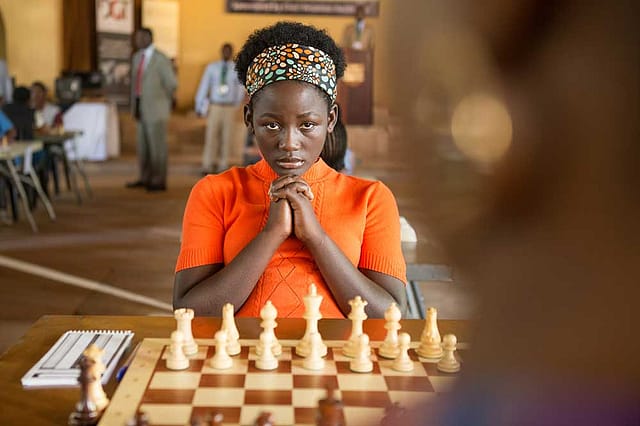Queen of Katwe

Over a long period of film making, Mira Nair has defined herself as a chronicler of two central cultural experiences of the post colonial world. One is the mind of the immigrant, with souls torn apart by memories that grow more intense by the day, of inner and outer cultural conflicts, of a nagging anxiety that refuses to go away. The other is of young people, at home in their own society, but struggling to realize their potential in seemingly impossible circumstances, living in ghettos of the marginalized, in collapsing urban chaos.
'Queen of Katwe' is a film that is part of the second kind of cultural exploration. It is story of a group of kids in a shanty town called Katwe in Kampala, Uganda. Based on a book about how a 10 year old girl was turned into a chess champion by a man who was an Engineer by profession, but a missionary and an inspirational teacher by vocation, the film is a 'feel good' movie produced, in part, by Walt Disney Pictures.
Fortunately, the cinematic treatment is not 'disneyfied'. But unlike 'Salaam Bombay' the ensemble cast is not rooted in Ugandan society and speak largely in accented English, which, we hope, is accurate to the geographical and cultural ambience of a slum like Katwe. But for the first half hour of the film we are never sure of this, and see the speech and behavior of the characters as stereotyped. However, the consistency and conviction with which the director establishes a canvas and a community, allows us to get used to the individuals and the world they live in, and we stop focussing on the style of their speech.
Modi Rearms the Party: 2029 On His Mind
23 Jan 2026 - Vol 04 | Issue 55
Trump controls the future | An unequal fight against pollution
It is a tough act, and Nair pulls it off, but only just. The movie is not really the tale of triumph over mind boggling adversity, because so much of Hollywood is about this, but the idea of the transformational power of chess. As the chess instructor and the social community worker, Robert Katende (David Oyelowo), keep repeating to the kids he teaches: 'chess is about making plans'. Robert draws parallels between the intellectual strategy involved in the game, the ability to think many moves ahead of where you are right now, and, likewise, the skill involved in strategizing your way out of poverty and the shanty town. The questions are exactly the same. When you feel you are trapped, either on the board or in your social circumstances, how do you work your way out of a seemingly impossible situation? And, as in chess, you may lose a game, but you must think about your mistakes and work on a new plan that will work differently, and surprise people who have not anticipated it. That is how you develop, as a player and as a person, capable of using individual potential to crack restrictions in the environment you were born in.
Certainly, there is a missionary zeal to Robert Katende's effforts, a Franciscan compassion to his perspective. In one scene, we see him giving up a more lucrative job offer as a Government Engineer, so that he can spend more time creating a social movement of self empowerment. Chess is, in a sense, the instrument of Jesus, and the ecclesiastical power of the book and film is not to be underestimated in any discussion of both.
The chess star, Phiona Mutesi (Madina Nalwanga), is a natural, an intuitive thinker who thinks eight moves ahead of her game, and the actress who plays her is very convincing. The other performers, who play her family and friends, are competent and the film is put together well.
But when you look at the movie as an organic whole, what you see is a conscious construction of a society, a geographic and cultural entity in East Africa. You see a propagation of altruistic ideas in a developing nation. But you are given no real insight into that world. The film could just as easily have been set in Chennai or Kolkata. There is no cinematic innovation that reveals a new way of seeing things, as perhaps 'The Namesake' was able to do; to leave us with the sense of personal and civilizational loss that migration often results in. 'Queen of Katke' is a film that works well as you watch it, but does not leave behind a residue of emotion or thought, to which you can go back to.
